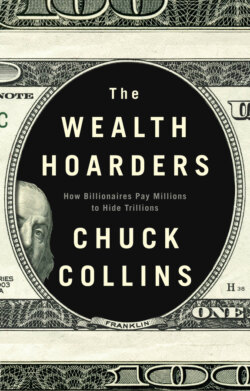Читать книгу The Wealth Hoarders - Chuck Collins - Страница 6
Foreword
ОглавлениеNicholas Shaxson
Chuck Collins, the author of this book, is a naive, foolish and selfish man. At least, that was the forceful view of a wealthy patrician who took him under her wing at a wealth management event in 1983, soon after he had learned that he would inherit a hefty fortune from the family meatpacking business.
His offense was not so much that he was queasy about his unearned fortune, or even that he might want to give wealth away to good causes. His crime was to countenance giving away “the principal” – the core set of family assets to be passed down from generation to generation. Real heirs, the grandmother explained, are supposed to live off income from the principal, but never invade the bedrock of family wealth. That “is the goose that lays the golden egg,” she said. “You don’t barbecue the goose.” To deprive later heirs of their dues, she said firmly, was folly and selfishness.
Such is the topsy-turvy moral system that pervades the world of wealth: a loose, informal, globalized network of highly mobile people who glide above nation states, increasingly clueless and detached from them, and ever more contemptuous of the laws, rules, regulations and taxes that bind the rest of us.
We know a lot about the super-wealthy, but The Wealth Hoarders has a different, highly illuminating focus: the “enablers” – the private army of bankers, lawyers, accounting firms, consulting companies, family offices, and other specialists that help them hide and protect their wealth. These enablers make sure that the cloud where the rich reside is increasingly where the power and the rewards from risk-taking are located, and that the earth below is where the work is done and the costs of those profitable risks are absorbed. This is as much about inequality as it is about the corruption of capitalism.
These enablers build two sets of defenses around their wealth. The first are the castle walls and portcullises of legal protections for their clients: the secretive tax havens, devious and impenetrable trusts, hollow-shell companies and trickle-down charitable foundations, to stop outsiders – tax authorities, creditors, pursuing rich folk for unpaid bills, or forces of law and order – from entering the private playgrounds and disrupting the business of selflessly building and passing on dynastic family wealth.
This humorous, shocking, highly readable account, by one of those rare people who did give away his principal, also probes the second set of defenses: the glib self-justifications, pat phrases, simplistic diversions, and cocoons of self-congratulation with which the rich, their enablers, and their sponsored think tanks and commentators surround themselves, so as to avoid having to ask themselves the really difficult questions.
It may surprise some people, but the United States is arguably the world’s biggest tax haven. That is, it has for around half a century deliberately encouraged foreigners to send their (often ill-gotten) wealth to the US and park it in US real estate, US securities markets or US investment funds, all hidden behind a US-created veil of secrecy that bamboozles foreign tax authorities and crime-fighters. One might think that these inflows of capital benefit the United States. In fact, they help just a small section of individuals – not least, those in the Wealth Defense Industry – while delivering a payload of other, less visible, and bigger harms on the majority of Americans.
For example, the affairs and lives of global organized criminals, or of politicians looting Africa’s poorest nations, mingle seamlessly inside the castle walls with the most esteemed and powerful members of high society. The inevitable result has been the criminalization of our elites. With horror, I have watched this system undermine the political system in my own country, the United Kingdom, where it has got so bad that David Marchant, a prominent Miamibased commercial investigator of tax haven activities by wealthy people and corporations, told me that when he finds a British “Lord” or a “Sir” in an offshore corporate structure, he treats it as a red flag. A 2019 study of wealthy Scandinavians by the economists Annette Alstadsæter, Niels Johannesen, and Gabriel Zucman found that the average rate of (criminal) tax evasion for the broad population was less than three percent of total taxes owed – but among the top 0.01 percent that rate rose to well over 25 percent. (Much of the rest of their massive wealth and income would have avoided tax, through non-criminal means.) And, of course, in the United States, one does not have to look further than Donald Trump to understand how inflows of shady money can infect and corrupt democracy.
The damage inflicted also (of course) includes higher inequality, a scourge that Chuck Collins has fought against for many years. But the damage goes way further. The actions of the Wealth Defense Industry are worsening racial, gender, and regional disparities and tensions, making housing less affordable, boosting organized crime, corrupting politics, undermining national security, and encouraging the looting of poor countries by small predatory cliques. The sum total of these dangers is unmeasurable. Along with climate change, the rise of artificial intelligence, and rising nuclear-tipped geopolitical tensions, tackling this amounts to one of the great challenges facing humanity.
This book, a “primer to the secrets of the money river,” is an essential reformers’ handbook for navigating these dangerous times now facing us – and future generations.
Nicholas Shaxson, June 2020
Author of Treasure Islands: Tax Havens and the Men Who Stole the World, and The Finance Curse: How Global Finance Is Making us All Poorer.
